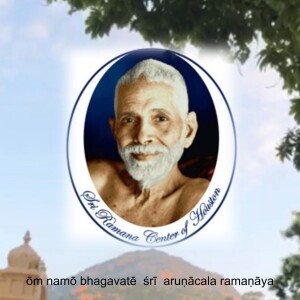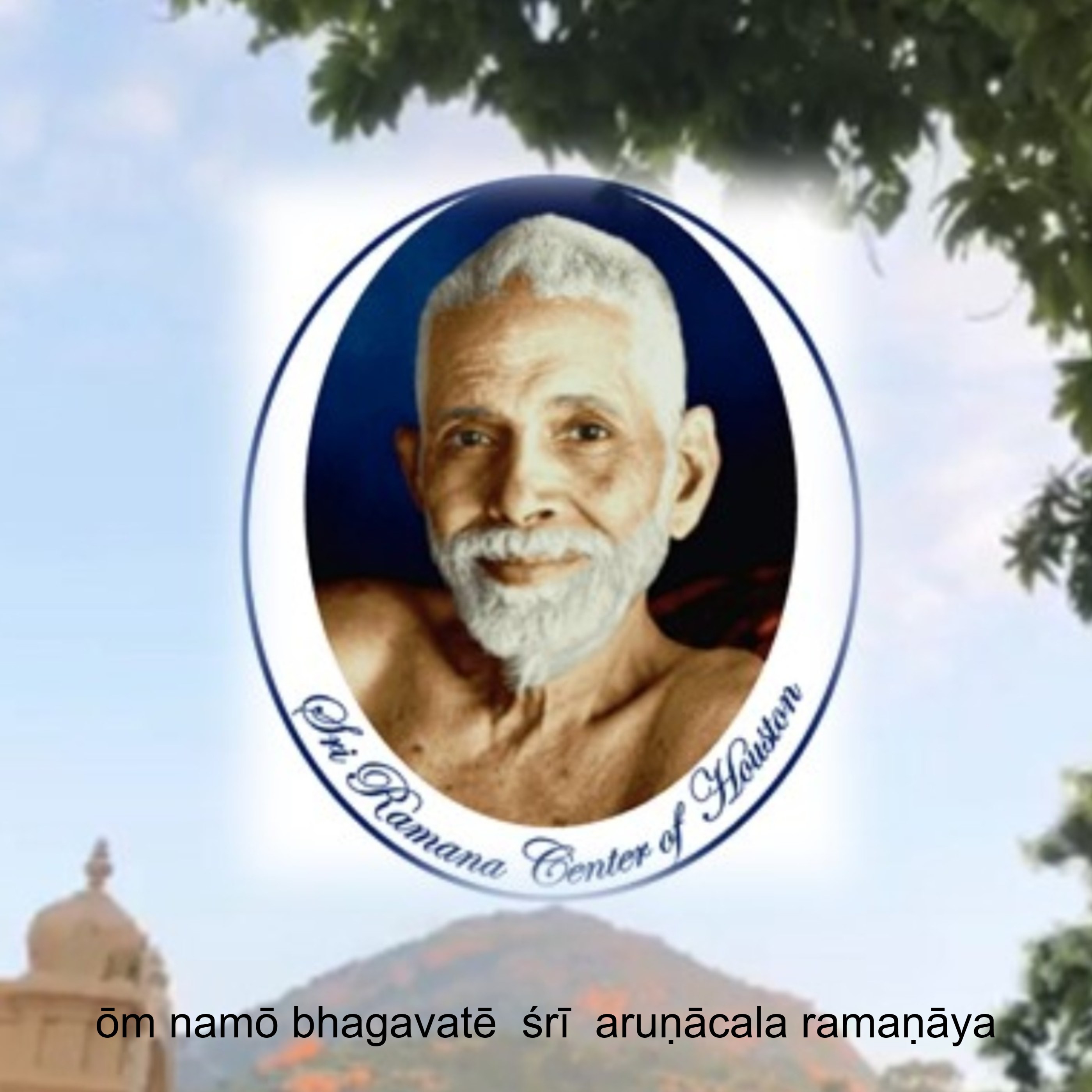Episodes

Sunday Sep 19, 2021
Nan Ar? (Who am I?) paragraph 14
Sunday Sep 19, 2021
Sunday Sep 19, 2021
In a Zoom meeting of the ‘Ramana Maharshi Foundation UK’ on 11th September 2021 Michael James discusses the fourteenth paragraph of Nāṉ Ār? (Who am I?) sentence by sentence:
சுகமென்பது ஆத்மாவின் சொரூபமே;
sukham-eṉbadu ātmāviṉ sorūpamē;
What is called sukha [happiness, satisfaction, joy, ease, comfort or pleasantness] is only the svarūpa [the ‘own form’ or real nature] of ātmā [oneself];
சுகமும் ஆத்மசொரூபமும் வேறன்று.
sukhamum ātma-sorūpamum vēṟaṉḏṟu.
sukha and ātma-svarūpa [one’s own real nature] are not different.
ஆத்மசுகம் ஒன்றே யுள்ளது;
ātma-sukham oṉḏṟē y-uḷḷadu;
Ātma-sukha [happiness that is oneself] alone exists;
அதுவே ஸத்யம்.
aduvē satyam.
that alone is real.
பிரபஞ்சப்பொருள் ஒன்றிலாவது சுகமென்பது கிடையாது.
pirapañca-p-poruḷ oṉḏṟil-āvadu sukham-eṉbadu kiḍaiyādu.
What is called sukha [happiness or satisfaction] is not found [obtained or available] in even one of the objects of the world.
அவைகளிலிருந்து சுகம் கிடைப்பதாக நாம் நமது அவிவேகத்தால் நினைக்கின்றோம்.
avaigaḷilirundu sukham kiḍaippadāha nām namadu avivēkattāl niṉaikkiṉḏṟōm.
We think that happiness is obtained from them because of our avivēka [lack of judgement, discrimination or ability to distinguish one thing from another].
மனம் வெளியில் வரும்போது துக்கத்தை யனுபவிக்கிறது.
maṉam veḷiyil varum-pōdu duḥkhattai y-aṉubhavikkiṟadu.
When the mind comes out [from ātma-svarūpa], it experiences duḥkha [dissatisfaction, discomfort, uneasiness, unpleasantness, unhappiness, distress, suffering, sorrow, sadness, pain or affliction].
உண்மையில் நமது எண்ணங்கள் பூர்த்தியாகும்போதெல்லாம் அது தன்னுடைய யதாஸ்தானத்திற்குத் திரும்பி ஆத்மசுகத்தையே யனுபவிக்கிறது.
uṇmaiyil namadu eṇṇaṅgaḷ pūrtti-y-āhum-pōdellām adu taṉṉuḍaiya yathāsthāṉattiṟku-t tirumbi ātma-sukhattaiyē y-aṉubhavikkiṟadu.
In truth, whenever our thoughts [wishes or hopes] are fulfilled, it [the mind] turning back to its proper place [the heart, our real nature, which is the source from which it rose] experiences only ātma-sukha [happiness that is oneself].
அப்படியே தூக்கம், சமாதி, மூர்ச்சை காலங்களிலும், இச்சித்த பொருள் கிடைக்கிறபோதும், வெறுத்த பொருளுக்கு கேடுண்டாகும் போதும், மனம் அந்தர்முகமாகி ஆத்மசுகத்தையே யனுபவிக்கிறது.
appaḍiyē tūkkam, samādhi, mūrccai kālaṅgaḷilum, icchitta poruḷ kiḍaikkiṟa-bōdum, veṟutta poruḷukku kēḍuṇḍāhum-bōdum, maṉam antarmukham-āhi ātma-sukhattaiyē y-aṉubhavikkiṟadu.
Likewise at times of sleep, samādhi [a state of manōlaya or temporary dissolution of mind brought about by prāṇāyāma or other such yōga practices] and fainting, and when anything liked is obtained, and when destruction [damage, elimination or removal] occurs to anything disliked, the mind becoming antarmukham [inward facing] experiences only ātma-sukha.
இப்படி மனம் ஆத்மாவை விட்டு வெளியே போவதும், உள்ளே திரும்புவதுமாக ஓய்வின்றி யலைகிறது.
ippaḍi maṉam ātmāvai viṭṭu veḷiyē pōvadum, uḷḷē tirumbuvadum-āha ōyviṉḏṟi y-alaikiṟadu.
In this way the mind wanders about incessantly, going outside leaving oneself, and [again] turning back inside.
மரத்தடியில் நிழல் சுகமா யிருக்கிறது.
marattaḍiyil niṙal sukham-āy irukkiṟadu.
At the foot of a tree the shade is pleasant [comfortable or delightful].
வெளியில் சூரியவெப்பம் கொடுமையா யிருக்கிறது.
veḷiyil sūriya-veppam koḍumai-y-āy irukkiṟadu.
Outside the heat of the sun is severe [or harsh].
வெளியி லலையு மொருவன் நிழலிற் சென்று குளிர்ச்சி யடைகிறான்.
veḷiyil alaiyum oruvaṉ niṙaliṯ ceṉḏṟu kuḷircci y-aḍaikiṟāṉ.
A person who is wandering outside is cooled [literally, obtains coolness or cooling] [by] going into the shade.
சிறிது நேரத்திற்குப் பின் வெளிக்கிளம்பி வெப்பத்தின் கொடுமைக் காற்றாது, மறுபடியும் மரத்தடிக்கு வருகின்றான்.
siṟidu nērattiṟku-p piṉ veḷi-k-kiḷambi veppattiṉ koḍumaik kāṯṟādu, maṟupaḍiyum marattaḍikku varugiṉḏṟāṉ.
After a short while emerging outside, [but] being unable to withstand [or bear] the severity of the heat, he again comes to the foot of the tree.
இவ்வாறு நிழலினின்று வெயிலிற் போவதும், வெயிலினின்று நிழலிற் செல்வதுமாயிருக்கிறான்.
ivvāṟu niṙaliṉiṉḏṟu veyiliṯ pōvadum, veyiliṉiṉḏṟu niṙaliṯ celvadum-āy-irukkiṟāṉ.
In this way he remains, going from the shade into the sunshine, and going [back] from the sunshine into the shade.
இப்படிச் செய்கிறவன் அவிவேகி.
ippaḍi-c ceygiṟavaṉ avivēki.
A person who does thus is an avivēki [someone lacking judgement, discrimination or ability to distinguish].
ஆனால் விவேகியோ நிழலைவிட்டு நீங்கான்.
āṉāl vivēkiyō niṙalai-viṭṭu nīṅgāṉ.
But a vivēki [someone who can judge, discriminate or distinguish] will not depart leaving the shade.
அப்படியே ஞானியின் மனமும் பிரம்மத்தை விட்டு நீங்குவ தில்லை.
appaḍiyē ñāṉiyiṉ maṉamum birammattai viṭṭu nīṅguvadillai.
Likewise the mind of the jñāni [one who is aware of one’s real nature] will not depart leaving brahman [that which alone exists, namely pure awareness, which is infinite happiness and one’s own real nature].
ஆனால் அஞ்ஞானியின் மனமோ பிரபஞ்சத்தி லுழன்று துக்கப்படுவதும், சிறிது நேரம் பிரம்மத்திற்குத் திரும்பி சுக மடைவதுமா யிருக்கிறது.
āṉāl aññāṉiyiṉ maṉamō pirapañcattil uṙaṉḏṟu duḥkha-p-paḍuvadum, siṟidu nēram birammattiṟku-t tirumbi sukham aḍaivadum-āy irukkiṟadu.
But the mind of the ajñāni [one who is not aware of one’s real nature] remains experiencing duḥkha [dissatisfaction or suffering] [by] roaming about in the world, and for a short while obtaining sukha [satisfaction or happiness] [by] returning to brahman.
ஜக மென்பது நினைவே.
jagam eṉbadu niṉaivē.
What is called the world is only thought [because like any world that we experience in a dream, what we experience as the world in this waking state is nothing but a series of perceptions, which are just thoughts or mental phenomena].
ஜகம் மறையும்போது அதாவது நினைவற்றபோது மனம் ஆனந்தத்தை யனுபவிக்கின்றது;
jagam maṟaiyum-bōdu adāvadu niṉaivaṯṟa-bōdu maṉam āṉandattai y-aṉubhavikkiṉḏṟadu;
When the world disappears, that is, when thought ceases, the mind experiences happiness;
ஜகம் தோன்றும்போது அது துக்கத்தை யனுபவிக்கின்றது.
jagam tōṉḏṟum-pōdu adu duḥkhattai y-aṉubhavikkiṉḏṟadu.
when the world appears, it experiences duḥkha [dissatisfaction or suffering].
While discussing this paragraph Michael also refers to and/or discusses the following other passages from Bhagavan’s writings:
Nāṉ Ār? paragraphs 1, 4, 6, 7 and 13
Upadēśa Undiyār verses 13, 14 and 16
This episode can also be watched as a video: 2021-09-11a Ramana Maharshi Foundation UK: Michael James discusses Nāṉ Ār? (Who am I?) paragraph 14.
After discussing this fourteenth paragraph of Nāṉ Ār? Michael answers questions about this and other aspects of Bhagavan’s teachings, particularly the practice of self-investigation and self-surrender, and this part of the meeting is recorded in a separate episode: Nan Ar? (Who am I?) paragraph 14 Q&A.


Comments (0)
To leave or reply to comments, please download free Podbean or
No Comments
To leave or reply to comments,
please download free Podbean App.